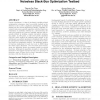Free Online Productivity Tools
i2Speak
i2Symbol
i2OCR
iTex2Img
iWeb2Print
iWeb2Shot
i2Type
iPdf2Split
iPdf2Merge
i2Bopomofo
i2Arabic
i2Style
i2Image
i2PDF
iLatex2Rtf
Sci2ools
GECCO
2010
Springer
2010
Springer
Real-coded genetic algorithm benchmarked on noiseless black-box optimization testbed
Genetic algorithms—a class of stochastic population-based optimization techniques—have been widely realized as the effective tools to solve complicated optimization problems arising from the diverse application domains. Originally developed version was a genetic algorithm with the binary representation of candidate solutions (i.e. chromosomes), the real-coded versions are, however, basically superior and frequently utilized in tackling complex real-valued optimization tasks. In this paper, a real-coded genetic algorithm (RCGA), which employs an adaptive-range variant of the well-known non-uniform mutation, is furnished with a multiple independent restarts mechanism to benchmark the noisefree black-box optimization testbed. The maximum number of function evaluations for each run is set to 50000 times the search space dimension. For low search space dimensions, the algorithm shows encouraging results on several functions. Although the algorithm is unable to solve all the functions ...
GECCO 2010 | Genetic Algorithm | Optimization | Search Space Dimensions | Stochastic Population-based Optimization |
| Added | 30 Aug 2010 |
| Updated | 30 Aug 2010 |
| Type | Conference |
| Year | 2010 |
| Where | GECCO |
| Authors | Thanh-Do Tran, Gang-Gyoo Jin |
Comments (0)

